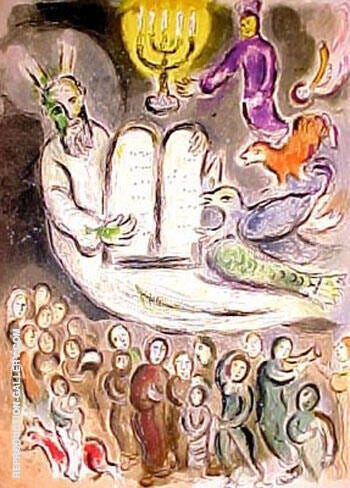The Old Testament lectionary text for this coming Sunday is Exodus 20:1-4, 7-9, 12-20 where God meets Moses on Mount Sinai and gifts his Israel with the Ten Commandments.
In order to read the torah in a gospel register, Christians must remember that the events of the Exodus generally and the giving of the law especially sequentially follow but logically precede the events narrated in the Book of Genesis.
The Book of Esdras professes plainly, “It was us that you created the world.”
The order is important.
Creation serves the covenant; the covenant does not serve creation.
Thus, even though the commandments come later at Mount Sinai they are a priori in the creative aim of God. When God speaks winged creatures into existence, when his word hangs the stars in the sky and alights upon the dark waters and brings forth life, God already has in mind his people, Israel and the church.
God creates precisely in order to have unto himself a peculiar people ordered according to a particular polity— torah, law. Indeed the initial act of creation is itself an instance of law. God said and there was; that is, God commands the world to be and the command is obeyed, and the event of obedience is the existence of the world. God creates the world by utterance of moral intention for beings other than himself.
Thus God’s creating of the world is agency of the same sort as the torah by which he creates Israel.
As Robert Jenson notes:
God speaks Torah even where there is nothing, and even so is obeyed; the existence of creatures is exactly this obedience. To hear God’s command is, therefore, to be refreshed in my very being: “My delight is in the Lord’s Torah, and thereon I meditate day and night.”
In his Large Catechism, the Protestant Reformer Martin Luther teaches that “anyone who knows the Ten Commandments perfectly knows the entire scriptures.” Surely this is a ridiculous assertion unless God’s act from creation to Kingdom is one of moral intention.
God created in order to have a people ordered to a polity.
Creation’s purpose is the particular covenant with a peculiar people ordered to a polity stipulated in the torah. That this obedience is the occasion for our existence reveals the nature of sin. “It would seem to follow,” Jenson writes, “that not to obey God’s commandments is not to be.”
To sin is to cease to be.
Keep reading with a 7-day free trial
Subscribe to Tamed Cynic to keep reading this post and get 7 days of free access to the full post archives.





